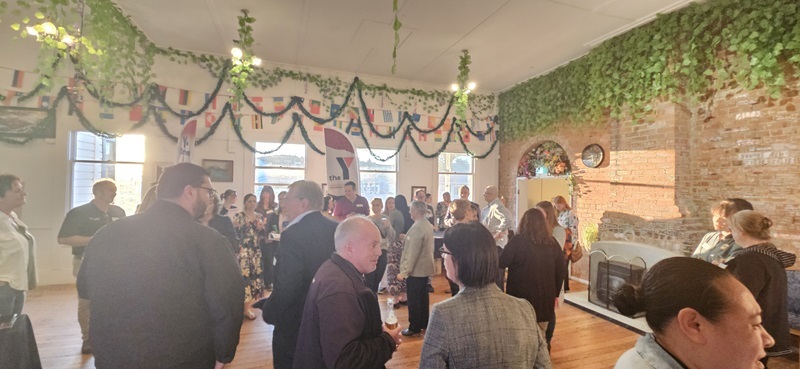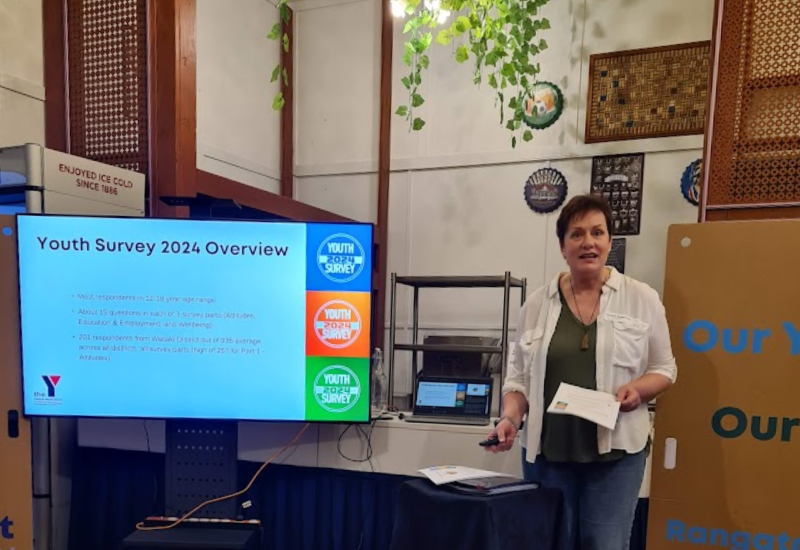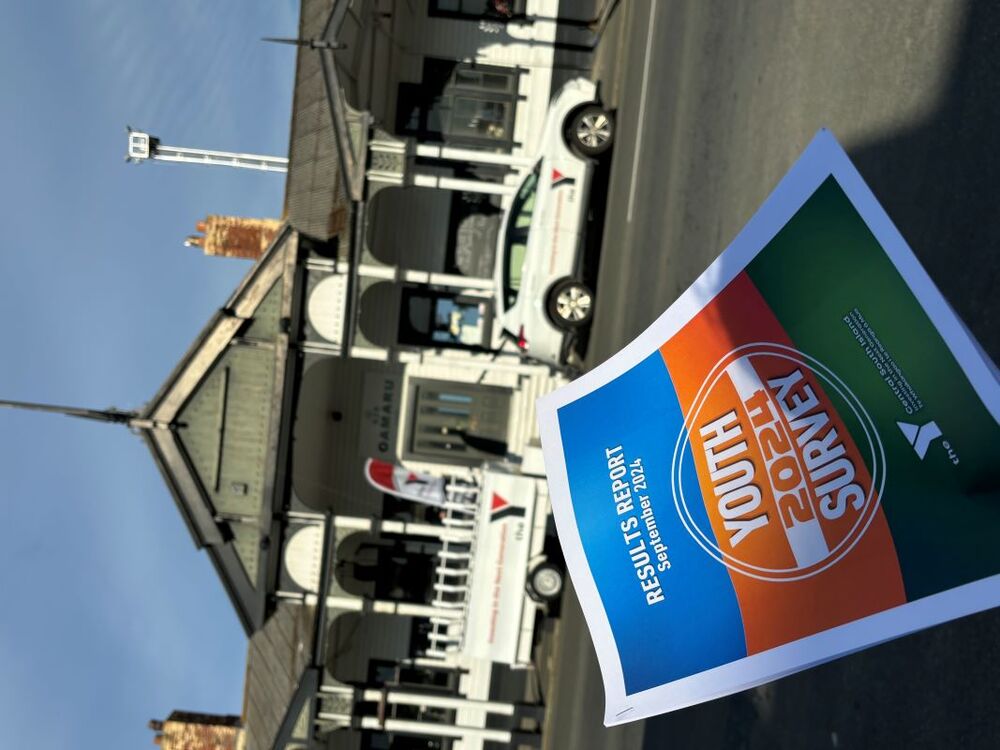Survey 'takes the pulse' of region's youth, offers them a voice
Ashley Smyth
04 September 2024, 2:11 AM
 The Y Central South Island chief executive Keith Shaw speaks at an event at The Station Yuan's on Monday night. Photo: Cara Tipping Smith
The Y Central South Island chief executive Keith Shaw speaks at an event at The Station Yuan's on Monday night. Photo: Cara Tipping SmithYoung people are the future of this community, and we need to really listen to them, says The Y Central South Island chief executive Keith Shaw.
Keith spoke in Ōamaru on Monday night (2 September), at a Business South BA5 (Business After 5pm) event hosted by The Y, and held at The Station Yuan’s on Humber Street.
The purpose of the event was to share results of the Youth Survey 2024, which is conducted to “take the pulse” of the region’s taiohi, aged 12-24 years, on a range of topics.
About 935 young people from Waitaki, Waimate, Mackenzie, Timaru and Ashburton districts took part in the survey - which was split into three parts: Attitudes, Education and Employment, and Wellbeing.
The Y Central South Island has conducted the survey every two years, since 2014, as a public service and advocacy project to give the area’s young people a voice.
Survey results are widely shared with local government, health, education, social sector organisations, and the business community to help inform and improve services for young people.
Youth Survey project manager Michèle Keggenhoff says it is the Y’s “great hope and expectation that service providers, planners, strategists and decision-makers across the region will take note and take action”.
This is the first time Waitaki has been included in the survey, and new questions this year include factors and barriers in choosing a career, the impact of the cost of living crisis, access and barriers to medical and mental health services, Rainbow support services, the effect of social media usage on well-being, and the Government’s ban on cellphones in schools.
Key findings from the Youth Survey 2024 Results Report are that overall, quality of life is pretty “sigma” for Waitaki youth, you gave it a rating of 4.01 stars out of 5 - slightly higher than the average of 3.87 stars across all the districts.

A crowd of about 45 attended Monday night's event. Photo: Nico Cousau
Young people identified their top five health issues as vaping/smoking 82% (2021: 78%), mental health/depression/stress 62% (2021: 64%), bullying 56% (2019: 54%), social media addiction 46% (2021: 35%) and alcohol 40% (2019: 50%).
Drugs has dropped out of the top five for the first time since the youth survey began in 2014, and self-harm (29%) and eating disorders (12%) appear in the survey for the first time.
Health issues among the small number (62) of gender-diverse respondents varied slightly, with mental health/depression/stress notably high at 86%, vaping/smoking next at 71%, bullying at 64%, and self-harm and eating disorders also disturbingly high for this group, at 43% for each.
Nearly a quarter (23%) of young people say it is ‘difficult’ or ‘very difficult’ to get help for a medical health issue in their district, with Waitakians finding it the most challenging at 28%. (Ashburton 22%, Timaru 19%).
For mental health issues specifically, this increases to 28% across all districts, although there is only a slight rise in the Waitaki to 29%, while Ashburton jumps to 35% (Timaru 22%).
Among the gender-diverse respondents, the figures are again much higher - with 50% struggling to access help for medical health issues and 75% for mental health issues.
Not having the confidence to acknowledge that help is needed is a big barrier to accessing medical or mental health services, although many commented they are not taken seriously when they do seek help.
Lack of qualified staff, long waiting lists and cost were also frequently identified barriers.
Survey results are remarkably similar across districts, Michèle says.

Youth Survey project manager Michèle Keggenhoff. Photo: Cara Tipping Smith
“Since the inception of the Youth Survey in 2014, young people consistently tell us they mostly have a good quality of life and that their district is a pretty good place to live – although there could always be more made available for young people to do.
“But they also consistently tell us they are stressed.”
Stress or anxiety negatively affects on average 41% of young people (2021: 44%) “most of the time” or “always” (ASH 50%, TIM 40%, WTK 36%), according to the survey.
By age 16 that figure reaches 58% (2021: 59%) and continues to increase with age, a pattern seen in all previous surveys.
“On their journey to adulthood, they juggle the demands of school, extracurricular and work obligations for some, societal expectations and judgements, and there are few opportunities for them to have a say on policies and decisions that affect them.
“This survey is one way of enabling their voice to be heard,” Michèle says.
The thing young people most wish employers understood about them is they make mistakes and are still learning.
Young people also feel strongly that age does not define capability, and they do not all fit the phone-obsessed slacker stereotype, but can be hard workers who should be valued and encouraged.
Keith says at The Y, they “listen to young people” and are proud of their accomplishments. Young people who come to them to further their education generally have struggled in mainstream school for a variety of reasons.
“Everyone makes their own stereotypical view of what that might be, I'm telling you, it's probably nothing like what you're thinking about.
“It's actually their journey that we in the Y respond to, their need and their academic outcomes."
The Y has had a presence in Ōamaru since 2013, and the organisation is keen to increase its “on-the-ground” youth work support in the town.
“And that's not about competing, it's about finding gaps in this community that are not filled. We're not here to compete with those who do this work well. We're here to walk alongside and work alongside."

Photo: Nico Cousau
Keith asked that people “listen hard” to the youth voice.
“You don't necessarily have to agree with everything you hear, but you definitely do need to listen hard and reflect on how this could inform our mahi, okay?
“Because, actually, young people are the future of this community. And no matter how wise we think we are, it is important that youth have a voice and that's what this project is about."
Business South Waitaki navigator Rebecca Finlay, who facilitated Monday’s event, says the depth of information in the survey is impressive and validates a lot of the work they do to create pathways for school leavers.
“It’s also given us direction at Waitaki District Council and Business South on placemaking projects and how to create the right workforce for the current and future economy,” she says.
“I’d personally like to commend Michèle on this highly valuable body of research.”
(additional reporting Cara Tipping Smith)



